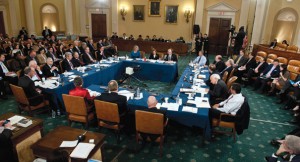 The Senate recently passed the bipartisan Energy Policy Modernization Act (S.2012), co-authored by Senators Lisa Murkowski (R-AK) and Maria Cantwell (D-WA), by a vote of 85-12. In 2015, the House passed its own comprehensive energy efficiency bill, the North American Energy Security and Infrastructure Act of 2015 (H.R.8). The bills will shortly head to a Conference committee whose efforts to reconcile different language, in areas like energy efficiency, could face a difficult challenge.
The Senate recently passed the bipartisan Energy Policy Modernization Act (S.2012), co-authored by Senators Lisa Murkowski (R-AK) and Maria Cantwell (D-WA), by a vote of 85-12. In 2015, the House passed its own comprehensive energy efficiency bill, the North American Energy Security and Infrastructure Act of 2015 (H.R.8). The bills will shortly head to a Conference committee whose efforts to reconcile different language, in areas like energy efficiency, could face a difficult challenge.
The White House strongly opposes H.R.8, stating that it “undermines successful initiatives designed to modernize the Nation’s energy infrastructure and increase our energy efficiency.” According to an analysis by the American Council for an Energy-Efficiency Economy (ACEEE), H.R.8 would result in a net increase in energy consumption and greenhouse gas emissions relative to current law. Specifically, it would prevent the Department of Energy (DOE) from providing technical support for building code development. H.R.8 would also restrict DOE’s ability to enforce new appliance efficiency standards.
The senate’s energy efficiency bill (S. 2012) is more acceptable to the White House. Specifically, it includes a provision known as the SAVE Act, a measure that allows homeowners to finance energy efficiency projects through their home mortgages. S.2012 also directs DOE to take a more active role with building code development, adoption and enforcement by offering grants to states for codes that increase energy efficiency. Finally, the energy efficiency bill would boost efficiency standards in federal buildings. The likelihood of success for producing a reconciled bill this year may depend on whether the conferees can find common ground on the energy efficiency provisions.
I’m going to say what I said to Congress last year… Energy efficiency bills are a jobs bills and need to be discussed and voted on in a way that… Read more »
[…] Original Post […]
[…] Original Post […]
“You can ignore reality, but you can’t ignore the consequences of ignoring reality.” Discussing whether Congress should compromise on an energy efficiency bill is a bit like rearranging deck chairs… Read more »
I think the focus needs to be on influencing what the next Congress and Administration that comes into office in January does: rather than focusing attention on the current lame… Read more »